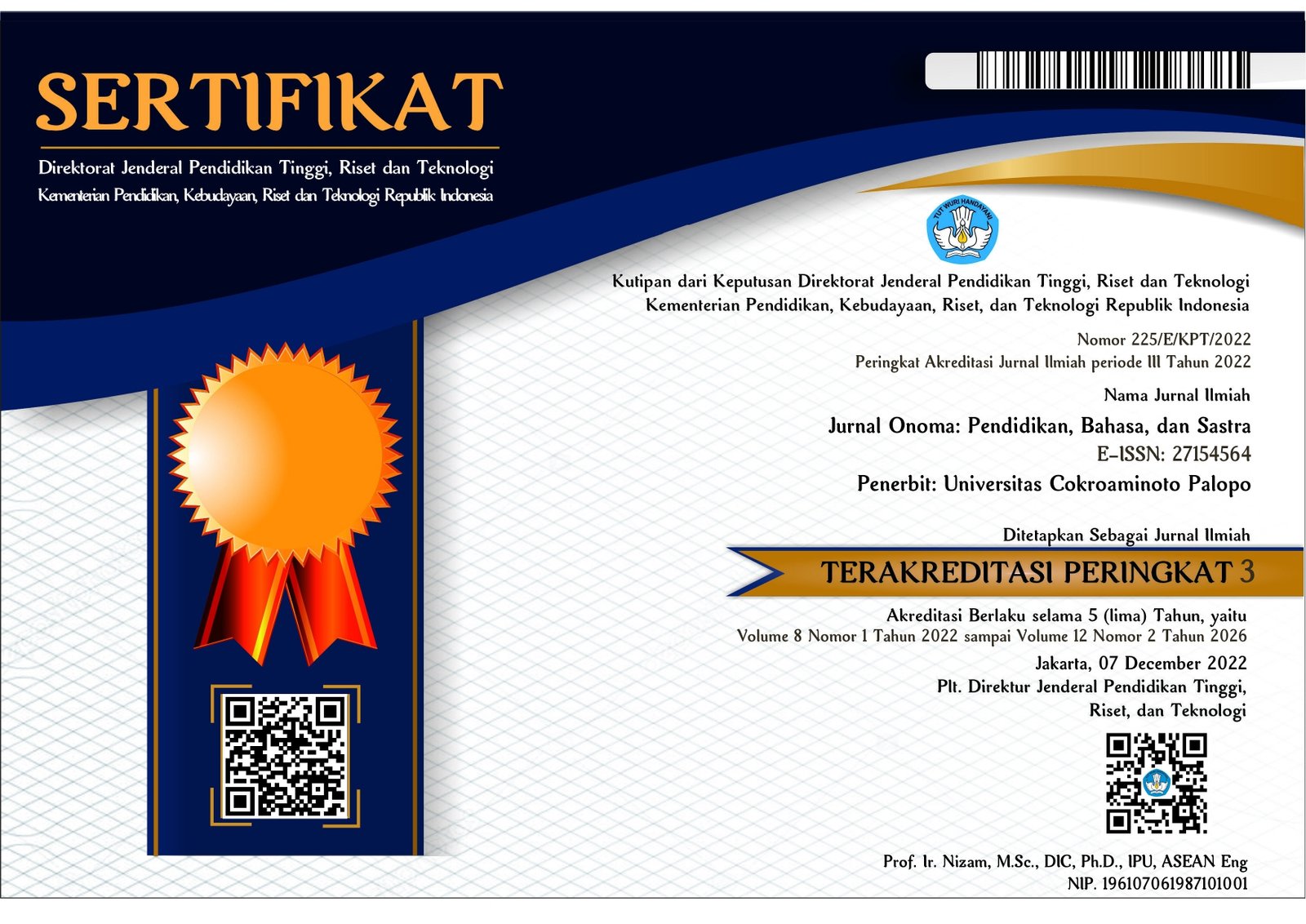Peran Bahasa dalam Interaksi Manusia dan Artificial Intelligence pada Terapi Kesehatan Mental
https://doi.org/10.30605/onoma.v11i1.4667
Keywords:
peran bahasa, artificial intelligence, terapi kesehatan mental, interaksi manusia-AIAbstract
Penelitian ini bertujuan untuk mengeksplorasi strategi bahasa yang digunakan oleh Artificial Intelligence (AI) dalam terapi kesehatan mental serta dampaknya terhadap pengalaman terapi pasien. Fokus penelitian ini adalah menganalisis bagaimana AI membangun interaksi kebahasaan dengan pasien dalam konteks terapi kesehatan mental di Indonesia ketika stigma terhadap gangguan psikologis masih menjadi tantangan utama. Metode yang digunakan dalam penelitian ini adalah metode kualitatif dengan pemanfaatan studi literatur. Hasil penelitian menunjukkan bahwa AI memiliki peran penting dalam meningkatkan akses terhadap layanan kesehatan mental, terutama bagi individu yang memiliki keterbatasan dalam mengakses terapis manusia. AI terbukti dapat membantu mengidentifikasi pola perilaku pasien, memberikan umpan balik terkait kondisi psikologis, dan menawarkan strategi manajemen stres yang berbasis kognitif-perilaku. Namun, penelitian juga menemukan bahwa keterbatasan AI dalam mengekspresikan empati dan membangun koneksi emosional dengan pasien menjadi kendala utama dalam efektivitas terapi berbasis AI. Selain itu, tantangan terkait infrastruktur teknologi yang belum merata dan rendahnya literasi digital masih menghambat pemanfaatan AI secara optimal di berbagai wilayah, terutama di Indonesia.
Downloads
References
Aisyaroh, N., Hudaya, I., & Supradewi, R. (2022). Trend penelitian kesehatan mental remaja di Indonesia dan faktor yang mempengaruhi: literature review. Scientific Proceedings of Islamic and Complementary Medicine, 1(1), 41-51. DOI: https://doi.org/10.55116/SPICM.V1I1.6
Devianto, Y., & Dwiasnati, S. (2020). Electronic Business Concept in Marketing of Village Leading Products. IJISCS (International Journal of Information System and Computer Science), 4(3), 172-181. DOI: https://doi.org/10.56327/ijiscs.v4i3.934
Fitzpatrick, K. K., Darcy, A., & Vierhile, M. (2017). Delivering cognitive behavior therapy to young adults with symptoms of depression and anxiety using a fully automated conversational agent (Woebot): A randomized controlled trial. JMIR Mental Health, 4(2), e19. DOI: https://doi.org/10.2196/mental.7785
Galea, S., Merchant, R. M., & Lurie, N. (2020). The mental health consequences of COVID-19 and physical distancing: The need for prevention and early intervention. JAMA Internal Medicine, 180(6), 817-818. DOI: https://doi.org/10.1001/jamainternmed.2020.1562
Irawan, D. A., Arifin, Y., Rustandi, I., Paramarta, V., & Yudhaputri, E. A. (2024). BUKU REFERENSI MSDM: Teori dan Penerapan MSDM pada era AI. PT Sonpedia Publishing Indonesia.
LeCun, Y., Bengio, Y., & Hinton, G. (2015). Deep learning. Nature, 521(7553), 436-444. DOI: https://doi.org/10.1038/nature14539
Naslund, J. A., Aschbrenner, K. A., Marsch, L. A., & Bartels, S. J. (2020). The future of mental health care: Peer-to-peer support and social media. Epidemiology and Psychiatric Sciences, 25(2), 113-122. DOI: https://doi.org/10.1017/S2045796015001067
Nurohmah, N., & Nurhadi, J. (2024). Tindak Tutur Direktif dalam Terapi Anak Autis. Jurnal Onoma: Pendidikan, Bahasa, dan Sastra, 10(1), 333-342. DOI: https://doi.org/10.30605/onoma.v10i1.3225
Reznek, M. (2019). The role of artificial intelligence in psychiatry. Psychiatric Clinics of North America, 42(4), 577-582.
Riskha, D. (2024). EMPOWERING MINDS: Strategi dan Sumberdaya untuk Meningkatkan Kesehatan Mental di Kalangan Anak Sekolah dan Mahasiswa.
Susskind, R. (2020). AI and the future of health care: Perspectives from ethics and law. Oxford University Press.
Teigens, V., Skalfist, P., & Mikelsten, D. (2022). The Conquest of Space. Cambridge Stanford Books.
World Health Organization (WHO). (2023). Mental health services: Global gaps and opportunities. Geneva: WHO.
Zebua, H., dkk. (2023). AI dalam kesehatan mental: Peluang dan tantangan di Indonesia. Jurnal Teknologi dan Kesehatan, 10(1), 24-35.
Downloads
Published
How to Cite
License
In submitting the manuscript to the journal, the authors certify that:
- They are authorized by their co-authors to enter into these arrangements.
- The work described has not been formally published before, except in the form of an abstract or as part of a published lecture, review, thesis, or overlay journal.
- That it is not under consideration for publication elsewhere,
- That its publication has been approved by all the author(s) and by the responsible authorities – tacitly or explicitly – of the institutes where the work has been carried out.
- They secure the right to reproduce any material that has already been published or copyrighted elsewhere.
- They agree to the following license and copyright agreement.
License and Copyright Agreement
Authors who publish with Onoma Journal: Education, Languages??, and Literature agree to the following terms:
- Authors retain copyright and grant the journal right of first publication with the work simultaneously licensed under Creative Commons Attribution License (CC BY 4.0) that allows others to share the work with an acknowledgment of the work's authorship and initial publication in this journal.
- Authors are able to enter into separate, additional contractual arrangements for the non-exclusive distribution of the journal's published version of the work (e.g., post it to an institutional repository or publish it in a book), with an acknowledgment of its initial publication in this journal.
- Authors are permitted and encouraged to post their work online (e.g., in institutional repositories or on their website) prior to and during the submission process, as it can lead to productive exchanges, as well as earlier and greater citation of published work.

















